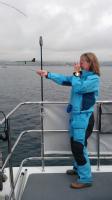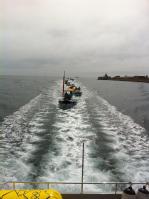2012 Olympics Volunteer: Rose Jarvis

Why did you decide to get involved in the London 2012 Games?
My involvement in the London 2102 Games is as a National Technical Officer for the sailing, which means I'll be on the water for the event. This builds on a role I've carried out for National and International sailing events over the last 10 years. The team I work with has been together for many years, and we're very excited to be involved in the Games. It's been a competitive process, with only five race management teams needed out of a volunteer force that runs sailing events all round the country, so I'm glad to be one of the lucky few. We are running the racing for the 49er class, which is one of the most dramatic, high-speed boats that take part in the Olympics.
What process did you have to follow to become a volunteer?
My involvement with the race management started ten years ago, so I've gradually built up my skills and experience since then, and that’s what’s enabled me to be in the right place to take on this role.
What training did you have to undertake?
We've been aiming towards the Games ever since we knew the sailing events would be held in Weymouth. We've gradually refined systems and processes to bring them to Olympic standard, and each event we do is used as a training event for the Games. Earlier this month we were part of a sailing regatta that was larger than the Olympics, and was run in the same waters. There were over 1000 sailors from 62 nations, and it was very much geared towards making sure the race management teams are ready for the Test Event this August, and the Games themselves.
What does the volunteer role involve?
We will be on the water several hours before the racing starts, assessing the conditions and monitoring the wind. Sailing isn't an easy sport to run, as it is so dependent on the weather. We have target times for the length of races, so if the wind drops or increases we need to alter the length of the course to keep it inside the time limit. If the wind changes direction during a race we may have to move one of the marks of the course in order to keep the race fair for everyone. So we set up the course, get the races started (not always an easy task if the wind shifts, or the competitors are too keen to get to the start line), monitor the race whilst it runs, and record the finishing positions (again, this can be challenging if several boats come across the finish line together at speed). There's not much time off during a set of races. We're hoping the weather will be good in August, but it can be pretty chilly on the water sometimes.
Have you applied for Olympic tickets?
Yes. I'd like to be able to go to something in the Olympic Stadium, but with the sailing taking up around 10 days, there isn’t much left after that finishes.
Have you been successful?
Sadly, no.
Where will you be watching the Games?
I'm lucky enough to be taking part in the Games, so I'll enjoy every minute of it.
Rose Jarvis is the CSI Project Co-ordinator.



